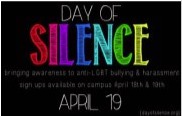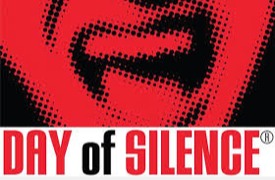April 2013 - Day of Silence
Day of Silence
The National Day of Silence is a day of action in which students across the country vow to take a form of silence to call attention to the silencing effect of anti-LGBT bullying and harassment in schools.

SDSU will observe the Day of Silence:
- Sign-ups available on the North Library Walkway April 18 and 19
- Look for LGBTQ Advisory Board's Day of Silence event on Facebook!
History

Founded in 1996, the Day of Silence has become the largest single student-led action towards creating safer schools for all, regardless of sexual orientation, gender identity or gender expression. From the first-ever Day of Silence at the University of Virginia in 1996, to the organizing efforts in over 8,000 middle schools, high schools, colleges and universities across the country in 2008, its textured history reflects its diversity in both numbers and reach.
The Day of Silence’s purpose is to bring attention to anti-LGBT name-calling, bullying and harassment and effective responses. The goal of the Day of Silence is to make schools safer for all students, regardless of sexual orientation and gender identity/expression. In a Harris Interactive study on bullying, students said two of the top three reasons students are harassed in school are actual or perceived sexual orientation and gender expression.
- Nearly 9 out of 10 LGBT students experience harassment at school.
- Students participate in the Day of Silence to bring attention to this problem, let students who experience such bullying know that they are not alone and ask schools to take action to address the problem.
Bringing Awareness to anti-LGBT bullying and harassment
Anti-LGBT bullying and harassment affects all students. Slurs such as "faggot" and "dyke" are commonplace in school. The Day of Silence is an example of students, from middle school to college, working together proactively to bring attention to the anti-LGBT name-calling, bullying and harassment experienced by LGBT and straight students alike.
GLSEN, the Day of Silence’s organizational sponsor, encourages participants to be counted by registering at www.dayofsilence.org.
A positive experience
The day is a positive educational experience. The Day of Silence is an opportunity for students to work toward improving school climate for all students. There is no single way to participate, and students are encouraged to take part in the way that is the most positive and uplifting for them.
